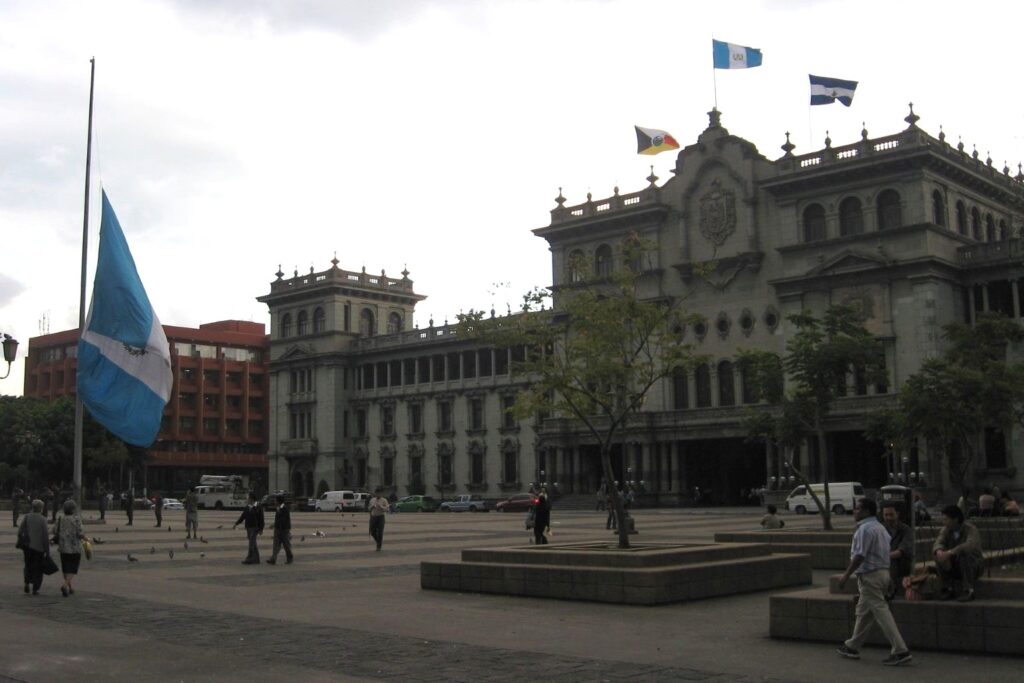Review of: Neil Shenai, Escaping the Governance Trap:Economic Reform in the Northern Triangle, (Cham, Switzerland: Palgrave Pivot, 2022).
David F. Varela Sr. is a second-year Doctor of International Affairs (DIA) student at the Johns Hopkins School of Advanced International Studies.
Escaping the Governance Trap by Neil Shenai arrives at a perfect time to enrich a renewed wave of scholarly interest about development issues in the Northern Triangle countries of Latin America (El Salvador, Guatemala, and Honduras). While this is not the first time the “trap” concept has been applied to the Latin America region, this book’s approach is unique. Other authors have written about the “middle-income” or the “poverty” traps threatening the whole region, but Shenai delves into the larger “governance” concept and proposes his own definition of a “governance trap” (and repeats it a few times so the reader does not forget it): “a path-dependent equilibrium in which weak states with contested authority fail to penetrate civil society and achieve self-sustaining economic growth, resulting in states that undersupply political order and economic opportunity.”
As the title suggests, Shenai believes it is possible for the Northern Triangle countries to break this vicious cycle. This approach not only departs from deterministic theories that see little chance for change in the region (like that of dependency), but also challenges the tradition of economic populism that a long series of charismatic strongmen (caudillos) have followed in the Northern Triangle, just to find the same dismal results. After the opening salvo, the book remains unhesitatingly optimistic. Shenai asserts that countries can break out of the trap if various development stakeholders—some external to the region—make the right economic policy decisions.
In Chapter 1, he defines the “governance trap” around a series of government pitfalls that continuously reinforce themselves and describes how countries can escape the trap and open the “getting to Denmark” gate (some economists’ term for successful economic development) through a series of policy interventions. The first step on this long journey is for the state to impose a monopoly on the use of force, which the countries of the Northern Triangle (as well as others in Latin America) have so far been unable to establish. A Hobbesian view of the world? Perhaps, but one that certainly matches the state authority deficit south of the Rio Grande. To further elaborate this point, Shenai develops six propositions about what a modern state should be and do, drawing from the fathers of modern political philosophy and sociology (Thomas Hobbes, of course, but also Max Weber) and the leading economists and political scientists of our own time (such as Douglass North and Francis Fukuyama). After establishing the political foundations of economic policy, Shenai moves confidently into the specific reform priorities of the Northern Triangle countries during the COVID-19 pandemic in Chapter 2, providing detailed recommendations about fiscal, monetary, exchange, and financial matters, as well as the real economy and structural reforms.
Shenai also makes clear in Chapter 3 that the trap can only be overcome if these reforms receive sustained support from international stakeholders, especially the United States, which has an interest in stemming migration from Central America. For that reason, his stakeholder analysis of international partners that may help the Northern Triangle countries escape the trap is both meticulous and encouraging. These small countries cannot make the trip to Denmark alone. They need the support of the traditional panoply of bilateral (United States, Canada) and multilateral donors (Bretton Woods institutions and the Inter-American Development Bank), but they should also engage new players such as Mexico, the vibrant diasporas, and private sector and civil society organizations in the United States, Canada, and Mexico. Mutual reinforcement and the identification of specific niches, such as the novel proposal of “diaspora bonds,” may leverage the reform process in a way that allows successive Northern Triangle administrations to incrementally transcend the governance weaknesses identified in the book. For the US government, Shenai proposes ten common sense principles of engagement that are generally consistent with the actual practices of the Biden administration,[1] except perhaps in connection with El Salvador, where the difficult relationship with President Nayib Bukele has forced the United States to look for alternatives. Shenai also warns the identified stakeholders to act during the small windows of opportunity for reforms, which may rapidly close, and to be sensitive to domestic political dynamics that can erode popular support for reform-oriented administrations.
This reviewer worked in the Northern Triangle as a member of the World Bank teams in charge of governance reforms between 1995 and 2012, and he could not avoid contrasting Shenai’s findings with his own. Initially, I was unable to share the author’s full-fledged optimism. It appears that very little has changed for the better in the region in more than twenty-five years. The Northern Triangle’s challenges remain essentially the same and the policy options quite similar. Comparing the policy issues described in Shenai’s book with the ones discussed in the Bretton Woods institutions’ reports of ten years ago, the progress of reform has been slow and marginal at best. Nevertheless, Shenai’s commitment to reforming the region is contagious. He persuasively argues that international cooperation should continue trying to provide all the support that domestic reformers deserve. Toward that end, Shenai charts a roadmap with a best-case scenario[2] realistically balanced by two less desirable alternatives. All stakeholders in the Northern Triangle’s economic future should explore the avenues mapped out in these scenarios. As noted in the conclusion to Chapter 3,[3] there are no perfect engagement strategies for the external players. The main responsibility for reform rests with the region’s governments, which must gather and maintain broad support at home and abroad for the reform agenda. Historically, this has been uncommon and unsustainable. Nevertheless, despite my initial skepticism about the Northern Triangle countries’ ability to deal with these seemingly intractable issues, I was finally persuaded by Shenai’s optimistic vision: these countries can and should try once more to make these reforms happen with the support of local and external stakeholders. Escaping the governance trap will be possible if policymakers pay close attention to Shenai’s recommendations about priorities and timing.
The book encourages further research under the “governance trap” framework developed by Shenai. For instance, it explicitly excludes “political and social reforms.”[4] However, as the author identifies “monopoly of force” as the top priority for reform, his work should prompt other scholars to explore the most difficult institutional reforms—those of the military, the police, and the justice system writ large (not only the courts but also prosecutors and the public defense). As the Northern Triangle countries continue to report some of the highest worldwide indicators of crime and violence, their governments must pursue these reforms despite the strong opposition of some vested interests in the leadership and staff of these institutions, which have continually underperformed in the delivery of basic citizen security and dispute resolution services. More than ten years after a comprehensive study by the World Bank identified these issues, the time may have come for new research to update the policy recommendations in these sensitive areas, particularly as the security conditions of the Northern Triangle continue to deteriorate.
Another area that Shenai’s book opens for further research is the reform dynamics of each Northern Triangle country. He acknowledges that the book’s comprehensive approach forced him to generalize despite each country’s unique history and context.[5] However, a given reform strategy’s chances of success may be closely related to country-specific elements. While the general prescriptions for the journey to Denmark may generate consensus among policymakers, the timing and sequencing of specific actions in each country could prove more contentious even at the scholarly level. A country-specific approach could help reformers identify the priorities that are achievable in a given period and ascertain the real chances of success in each context. In this field, the work of other economists may be useful to Shenai’s followers in the fascinating journey of economic development—one that may not go straight to Denmark but may have several unexpected stops.
There are a few peripheral areas where Shenai may have overstated the potential of some reforms, such as the international commissions against corruption and impunity. This has been tried several times, with those commissions having been established and disbanded in Guatemala (2006-2019), Honduras (2016-2020) and El Salvador (2019-2021). While the original intent was laudable (to support country authorities in the prosecution of complex criminal cases that overwhelmed the capacity of local institutions), the results were very limited in El Salvador and Guatemala. These governments rapidly backtracked from their initial support due to serious fears that the new institutions would turn against top officials in the incumbent administration. In Guatemala, the commission showed some significant results including the impeachment of President Pérez Molina in 2015 but was nevertheless disbanded by a subsequent administration that was resentful of its powers. These arrangements were not sustainable because they were imperfect substitutes for the actual independence and strengthening of the local judicial authorities. Therefore, it is unlikely that any future Latin American government would wish to follow that treacherous path.[6]
In sum, Escaping the Governance Trap is a valuable source for policymakers seeking to reform the economies of the Northern Triangle and perhaps in other Latin American countries as well. Setting aside clear outliers like Haiti, Nicaragua and Venezuela, various forms of the trap (like “predatory states”) exist in some Mexican and Colombian subnational governments. Others may be at risk of meeting certain criteria for Shenai’s governance trap at the national level, such as Argentina and Bolivia. Even Brazil, by far the largest country in the region, may now be exposed to the return of populism on both the right and the left. Therefore, readers can extend several propositions and conclusions in this book to these countries and subnational governments, provided that they consider the different contexts. For readers interested in the Northern Triangle, Escaping the Governance Trap should be a clarion call to explore new approaches to breaking free from the vicious cycles of poor governance typically associated with populism and patronage. Policymakers in the United States, the Northern Triangle, and throughout the Latin American subcontinent should heed this call and benefit from the analysis and recommendations detailed in this ground-breaking book.
Works Cited
OECD, Government at a Glance: Latin America and the Caribbean 2020, OECD iLibrary, March 20, 2020. https://doi.org/10.1787/13130fbb-en
“Trapped: high inequality and low growth in Latin America and the Caribbean.” United Nations Development Program, June 22, 2021. https://www.undp.org/press-releases/trapped-high-inequality-and-low-growth-latin-america-and-caribbean
Alejandro Foxley and Barbara Stallings (eds.), Innovation and Inclusion in Latin America: Strategies to Avoid the Middle Income Trap, (New York, NY: Palgrave MacMillan, 2016). https://link.springer.com/book/10.1057/978-1-137-59682-6
Ricardo Morán, Escaping the Poverty Trap: Investing in Children in Latin America, (Washington, DC: Inter-American Development Bank, 2003). https://publications.iadb.org/en/escaping-poverty-trap-investing-children-latin-america#:~:text=Escaping%20the%20Poverty%20Trap%20proposes,of%20the%20World%20Health%20Organization.
Patrice Franko, The Puzzle of Latin American Economic Development, (Lanham, MD: Rowman & Littlefield, 2018). https://books.google.com.co/books?hl=en&lr=&id=YE1nDwAAQBAJ&oi=fnd&pg=PP1&ots=j-i0GzW2fK&sig=T-MykgIZ_cH5rZWBj_bL89_IZUY&redir_esc=y#v=onepage&q&f=false
Rudiger Dornbusch and Sebastian Edwards (eds.), The Macroeconomics of Populism in Latin America, (Chicago IL: University of Chicago Press, 2007). https://www.nber.org/books-and-chapters/macroeconomics-populism-latin-america
Lant Pritchett and Michael Woolcock, Solutions when the solution is the problem: Arraying the disarray in development, (Washington DC: Center for Global Development Working Papers, 2007). https://pdf.usaid.gov/pdf_docs/Pcaab071.pdf
“Country Profile – El Salvador,” United Nations Office on Drugs and Crime. https://dataunodc.un.org/content/Country-profile?country=El%20Salvador
World Bank, Partners for Results – Highlights of the World Bank’s Work in Central America (Washington, DC: World Bank, 2012). https://documents1.worldbank.org/curated/en/940801468149376623/pdf/730970AR0Partn0C0disclosed010050120.pdf
World Bank, Crime and Violence in Central America: A Development Challenge (Washington, DC: World Bank, 2011). https://openknowledge.worldbank.org/handle/10986/2744
Brian Levy, Working with the Grain (Oxford, UK: Oxford University Press, 2014). https://ideas.repec.org/b/oxp/obooks/9780199363810.html
“Comisión Internacional Contra Impunidad: propuesta de equipo de empalme de Petro,” El Tiempo, August 1, 2022, https://www.eltiempo.com/politica/gobierno/comision-internacional-contra-impunidad-propuesta-del-empalme-de-petro-691659
[1] Pgs. 106-118.
[2] Pg. 145.
[3] Pgs. 125-126.
[4] Pg. 22.
[5] Pg. 23.
[6] Nevertheless, the transition team of President Petro mentioned the possibility of establishing an international anticorruption commission in Colombia, and a former CICIG head was appointed Minister of Defense of the new administration. “Comisión Internacional Contra Impunidad: propuesta de equipo de empalme de Petro,” El Tiempo, August 1, 2022, https://www.eltiempo.com/politica/gobierno/comision-internacional-contra-impunidad-propuesta-del-empalme-de-petro-691659




